English Literature w1
英文literature是什么汉语意思

英文literature是什么汉语意思英文literature是什么汉语意思英文literature是一个较为简单的单词,前提是我们要清楚它的汉语意思。
快来看看店铺为你准备了单词literature表达的汉语意思,欢迎大家阅读!literature的`汉语意思英 [ˈlɪtrətʃə(r)] 美 [ˈlɪtərəˌtʃʊr, -tʃɚ]第三人称复数:literatures名词文学; 文献; 文学作品; 著作相关例句名词1. She went through the literature on the subject.她查阅有关此一问题的资料。
2. He majors in Russian literature.他主修俄罗斯文学。
3. I shall take literature and mathematics this spring.今年春天我要修文学及数学。
literature的词典解释1. 文学;文学作品Novels, plays, and poetry are referred to as literature, especially when they are considered to be good or important.e.g. ...classic works of literature.文学经典e.g. ...a Professor of English Literature...英国文学教授2. (某一学科的)著述,文献,图书资料The literature on a particular subject of study is all the books and articles that have been published about it.e.g. The literature on immigration policy is almostunrelievedly critical of the state...移民政策方面的著述几乎总是会一成不变地批评政府。
高中英语阅读理解《Englishliterature》
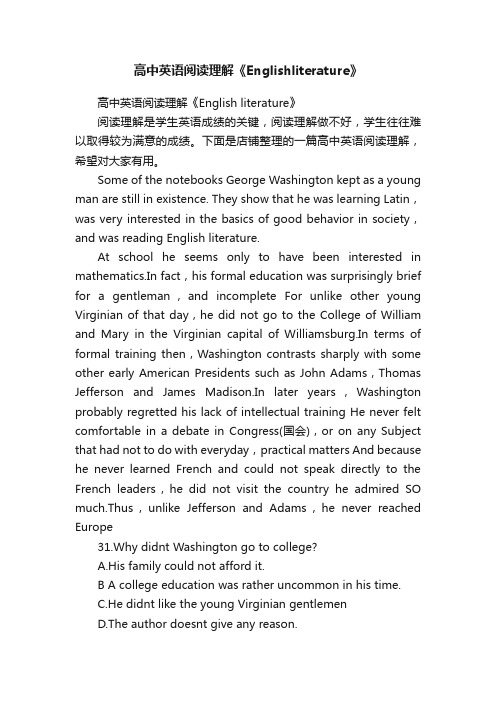
高中英语阅读理解《Englishliterature》高中英语阅读理解《English literature》阅读理解是学生英语成绩的关键,阅读理解做不好,学生往往难以取得较为满意的成绩。
下面是店铺整理的一篇高中英语阅读理解,希望对大家有用。
Some of the notebooks George Washington kept as a young man are still in existence. They show that he was learning Latin,was very interested in the basics of good behavior in society,and was reading English literature.At school he seems only to have been interested in mathematics.In fact,his formal education was surprisingly brief for a gentleman,and incomplete For unlike other young Virginian of that day,he did not go to the College of William and Mary in the Virginian capital of Williamsburg.In terms of formal training then,Washington contrasts sharply with some other early American Presidents such as John Adams,Thomas Jefferson and James Madison.In later years,Washington probably regretted his lack of intellectual training He never felt comfortable in a debate in Congress(国会),or on any Subject that had not to do with everyday,practical matters And because he never learned French and could not speak directly to the French leaders,he did not visit the country he admired SO much.Thus,unlike Jefferson and Adams,he never reached Europe31.Why didnt Washington go to college?A.His family could not afford it.B A college education was rather uncommon in his time.C.He didnt like the young Virginian gentlemenD.The author doesnt give any reason.32.Washington felt uncomfortable in Congress debates because he _____A.1acked practice in public speakingB.felt his education was not good enoughC.didnt like arguing and debating with peopleD felt that debating was like intellectual training33 The reason why Washington didnt visit France was probably that he _____A.didnt really care about goingB.didnt know French 1eadersC.couldnt communicate directly with the French leadersD.was too busy to Navel34 According to the author _____A Washingtons lack of formal education placed him at a disadvantage in later lifeB.Washington should have gone to France even though he could not speak FrenchC.Washington was not as good a president as Adams,Jefferson or MadisonD Washington was a model for all Virginian gentlemen35.The main idea of the passage is that Washingtons education ____A was of great variety,covering many SubjectsB was probably equal to those of most young gentlemen of his timeC.may seem poor by modern standards.but was good enough for his timeD was rather limited for a president答案:DBCAD高中英语阅读理解《English literature》篇1Jesse Owens was born in Alabama in the USA, in 1913. There were ten children in his family. Jesse was the youngest. He went to school in the city of Cleveland. At school he showed how good he was at athletics. He could run fast. He could jump high. He could jump far. ____1____In May, 1935 in Michigan, USA, he broke the world record for the long jump. This was his first world record. On the 25th May Jesse did something unusual. In 45 minutes he broke six world records. ____2________3____ There were only nineteen black athletes in the USA team. He won gold medals in the 100 meters race, the 200 meters race, the long jump and the relay race.Jesse was not a professional athlete. This meant that he could not get money for running. ____4____ To make money he had to appear in strange races. Sometimes he had to race against horses.In 1960 somebody broke Jesse's last world record. In 1980 Jesse died. (230)A. Later, he became a professional athlete.B. But he failed to go to the Olympic Games.C. So he became the top student for his excellent studies.D. People think this was the greatest athletics achievement ever.E. In 1936 Jesse went to the Olympic Games in Berlin, Germany.F. Because he was good at athletics, Jesse became a student at Ohio State University.Key:1. F2. D3. E4. AThe global population is living longer,and getting older,阅读理解答案The global population is living longer,and getting older,which presents new challenges. “The question becomes:who will take care of everyone While people will always be the best caregivers for people,there just aren’t enough people. That’s where robot17教育网:ic technology can really make a difference,” says Professor Maja Mataric at the University of Southern California.Her group is developing robots to work with stroke (中风) patients and elderly people. The research team has found that people react well to a robot gym instructor,and seem to get less frustrated with it than with instructions given on a computer screen. The robot can act as a perfect trainer,with infinite(极大的`) patience.“People say things like ‘I prefer this robot to my husband!Can I take it home’” according to Professor Mataric. “In fact there’s a really important point here. As we create these care giving technologies,we’re helping not only the people that need the care,but also the people caring for them. We can give them a break,and help them avoid burnout.”People are going to have to like,and importantly trust robots before they welcome them into their homes,and several groups around the world are working on making it easier to communicate with them.Much of human communication takes place through body language. Gestures,eye contact , and concepts of personal space are all things that robots are being taught. In learning about how people interact(互动) with machines,researchers are also discovering new roles for robots in our lives. Robots can communicate with humans in ways that other technologies can not.“If someone finds the robot to be more persuasive and more reliable,that’s going to affect how they interact with it,” says Dr Cynthia Breazeal, director of the Personal Robots Group at the Massachusetts Institute of T echnology. “We can now start to think about fields where it’s the social interaction,which is the main means by which a robot helps some one.” Dr Breazeal says that means robots could be used in education,learning,and health care,where social support is important.9.Professor Maja Mataric mainly focused on robots’ function of ________.A.teachingB.exploringC.making thingsD.giving care10.Why can robots be wonderful trainers in the gymA.Because they are more clever.B.Because they give correct instructions.C.Because they cost less money.D.Because they are more patient.11.The underlined word “burnout” in Paragraph 3 probably means “________”.A.feeling tiredB.feeling angryC.getting hurtD.becoming disappointed12.The scientists are presently working hard to help robots .A.to use less electricityB.to communicate betterC.to react more quicklyD.to have more functions答案解析:【答案】9.D10.D11.A12.B英语阅读答案Here’s something to think about the next time you ask your teacher for help:trying hard to do schoolwork on your own can help you learn.According to a recent study,the more you try while you are learning new information,the better you can remember it later.This might surprise you.When teachers are presenting new information,they often give students lots of help.But a new study shows this may not be the best way to support learning.“Don’t be too quick to get help when lea rning something new,”education expert Ma Kapur said.“Try to work on it yourself even if it means trying different ways.’’Kapur came up with the idea that trying hard can lead to better learning.Then he tested it out on students in Singapore.He separated students into two groups.In the first group,students were asked to solve math problems with the teacher’s help.In the second group,students were asked to solve the same problems by helping one another,instead of getting help from the teacher.With the teach er’s help,students in the first group were able to find the correct answers.Students in the second group did not solve the problems correctly.But they did come up with a lot of good ideas.The students were then tested on what they had 1earned.The group without any help from a teacher scored much higher than the group who had help.Kapur said working to find the answers helped students understand the process(过程),not just the solution.Kapur’s advice for kids is to put a 1ot of effort(努力)into learning something new rather than going to your teacher forhelp.“Simply doing a little work or nothing at all won’t work.”says Kapur.“Try to solve a problem in as many ways as possible.’’13.What is the best title for the textA.Work Your MindB.Practice Makes PerfectC.The Best Way to LearnD.Teachers’ Role in Schoolwork14.Manu Kapur holds that _______ .A.it’s necessary for students to ask for teachers’ helpB.students should try to solve problems by themselvesC.students with teachers’ help have more good ideasD.students in the first group are cleverer than those in the second group15.The author develops the text mainly by _________ .A. presenting research findingsB. comparing different opinionsC. showing scientific informationD. setting down general rules答案解析:【答案】13.A14.B15.A英语阅读及答案Motivation(动机) to satisfy one‘s needs is brought about by ―drives‖, These ―drives‖ do not determine man‘s behaviour, but rather direct man‘s energy towards certain aims. For example, man‘s body re quires food, which is a biological need, when this need comes up, man feels uncomfortable and histhoughts turn to getting food or satisfying that need. If he is very hungry, it will difficult for him to pay enough attention to anything except his need for food.While all men feel hungry, there is more than one method for helping free people of this uncomfortable feeling. How needs are satisfying depends on what we have been taught or what we have learned from our experiences. As we grow, we learn shat foods our society considers acceptable, and how they should be prepared and eaten. In some societies, for example, pork is considered a special food while in other societies it is strictly forbidden. In some societies fish is always cooked, but in other societies raw (生的) fish is preferred. The way in which we satisfy a drive is a learned response. Nature has not built a food –getting response into man. He cannot just eat whatever he wants of whenever there is food, his satisfaction of the hunger drive, for example, is limited by the rules of a society. Although we are hunger, according to the rules of society, we should not steal food, even if it belongs someone weaker than we are.1.According to the passage, ―drives‖ _____.A.can be brought about by motivationB..can always decide man‘s actionC.direct man‘s energy toward certain goalsD.follow man‘s motivations2. ____ is a biological need.A.MotivationB. DriveC. HungerD. Experience3. The writer hopes to tell us that ____.A. man should satisfy his biological needs whenever necessaryB.man‘s needs should always be satisfied without any conditionC.what man should do if he feels hungryD.man‘s satisfaction of needs is limited by the rules of a certain society答案:CCD。
English literature(1)
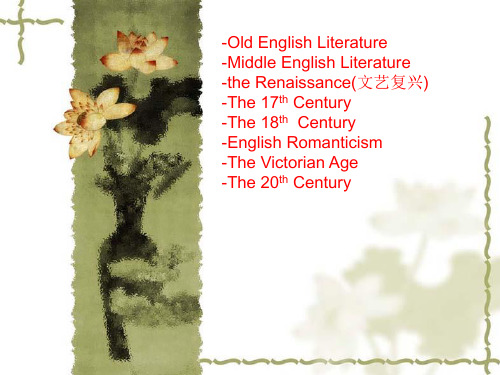
Literary representatives of this era
In this age, drama flourished more than any other form of literature. It’s no doubt that the most representative literate person in this times is the great play writeБайду номын сангаас William Shakespeare.
-Old English Literature -Middle English Literature -the Renaissance(文艺复兴) -The 17th Century -The 18th Century -English Romanticism -The Victorian Age -The 20th Century
Symbols of this era
This era was always divided to two parts: the pre-Elizabeth and the Elizabeth’s times. Their outstanding writers are separately Thomas More ,Thomas Wyatt and the great moral play writer William Shakespeare.
The first page of the Beowulf manuscript.
The English history: its foundation stone is the Anglo-Saxon Chronicle (编年史). It began by Alfred from the Roman invasion of Britain in 54 B.C. to the middle of the 12th century . Under the King’s direction, plenty of books from Europe in Latin on religion ,philosophy, and history were translated to the old England, still a wild and barbarous kingdom
englishofliterature5篇
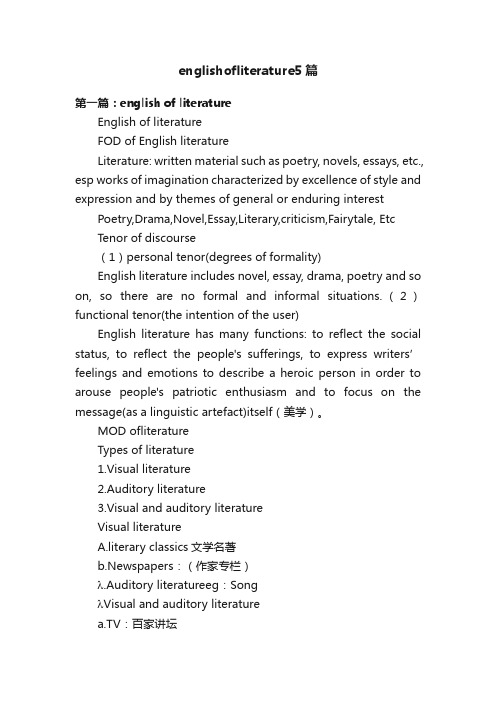
englishofliterature5篇第一篇:english of literatureEnglish of literatureFOD of English literatureLiterature: written material such as poetry, novels, essays, etc., esp works of imagination characterized by excellence of style and expression and by themes of general or enduring interest Poetry,Drama,Novel,Essay,Literary,criticism,Fairytale, EtcTenor of discourse(1)personal tenor(degrees of formality)English literature includes novel, essay, drama, poetry and so on, so there are no formal and informal situations.(2)functional tenor(the intention of the user)English literature has many functions: to reflect the social status, to reflect the people's sufferings, to express writers’ feelings and emotions to describe a heroic person in order to arouse people's patriotic enthusiasm and to focus on the message(as a linguistic artefact)itself(美学)。
14-15-English Literature 1-w1-intro
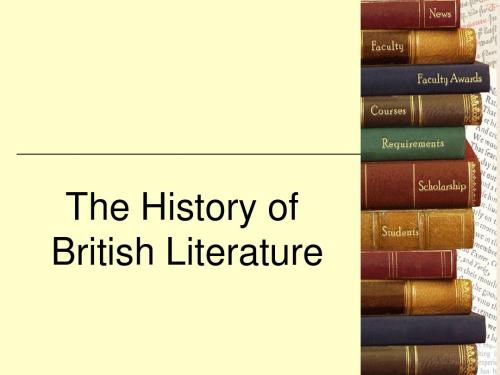
Politics of self-government Transportation system Cities Latin Language Christianity
English/Anglo-Saxon Conquest (446-1066)
Germanic tribes (Angles, Saxons, Jutes) from the Mediterranean coasts: Scandinavia, Denmark and Germany Enslaved the Celts and drove others to Wales, Scotland and Ireland Began feudalism: landlords and peasants The Pagans/heathens
Plato (429-347 BC): literature is a lie “appearance rather than the truth” Aristotle (384-322 BC): literature is mimesis “imitation of reality” English poet Sidney (1554-1586): “to teach and delight” Roman wand profit (aut delectare aut prodesse): aesthetic experience
3. To consolidate and extend the learners‟
knowledge and fluency in English through interaction with literary texts; 4. To further develop the learners‟ ability to recognize and express emotional and moral attitudes on a higher level than about daily occurrences so as to facilitate their communication with educated native speakers;
英美文学1
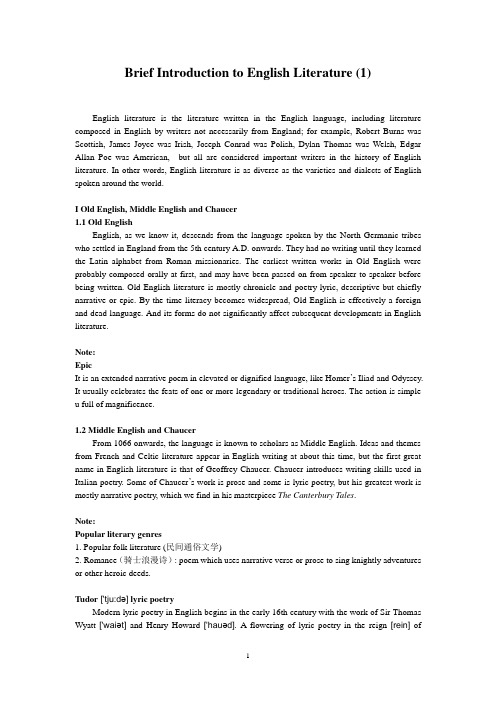
Brief Introduction to English Literature (1)English literature is the literature written in the English language, including literature composed in English by writers not necessarily from England; for example, Robert Burns was Scottish, James Joyce was Irish, Joseph Conrad was Polish, Dylan Thomas was Welsh, Edgar Allan Poe was American, but all are considered important writers in the history of English literature. In other words, English literature is as diverse as the varieties and dialects of English spoken around the world.I Old English, Middle English and Chaucer1.1 Old EnglishEnglish, as we know it, descends from the language spoken by the North Germanic tribes who settled in England from the 5th century A.D. onwards. They had no writing until they learned the Latin alphabet from Roman missionaries. The earliest written works in Old English were probably composed orally at first, and may have been passed on from speaker to speaker before being written. Old English literature is mostly chronicle and poetry-lyric, descriptive but chiefly narrative or epic. By the time literacy becomes widespread, Old English is effectively a foreign and dead language. And its forms do not significantly affect subsequent developments in English literature.Note:EpicIt is an extended narrative poem in elevated or dignified language, like Homer’s Iliad and Odyssey. It usually celebrates the feats of one or more legendary or traditional heroes. The action is simple u full of magnificence.1.2 Middle English and ChaucerFrom 1066 onwards, the language is known to scholars as Middle English. Ideas and themes from French and Celtic literature appear in English writing at about this time, but the first great name in English literature is that of Geoffrey Chaucer. Chaucer introduces writing skills used in Italian poetry. Some of Chaucer’s work is prose and some is lyric poetry, but his greatest work is mostly narrative poetry, which we find in his masterpiece The Canterbury Tales.Note:Popular literary genres1. Popular folk literature (民间通俗文学)2. Romance(骑士浪漫诗): poem which uses narrative verse or prose to sing knightly adventures or other heroic deeds.Tudor ['tju:də] lyric poetryModern lyric poetry in English begins in the early 16th century with the work of Sir Thomas Wyatt['waiət]and Henry Howard['hauəd]. A flowering of lyric poetry in the reign [rein] ofElizabeth I [i'lizəbəθ] comes with writers such as Sir Philip Sidney, Edmund Spenser['edmənd], Christopher Marlowe['kristəfə]and William Shakespeare. The major works of the time are Spenser’s Faerie Queene ['feiəri] and Shakespeare’s sonnets.Note:Sonnet:A poem in 14 lines; originated in Italy, a form very popular in Renaissance Europe, especially in Italy, France and England; introduced to England by Thomas Wyatt(怀亚特) and the Earl of Surrey (塞莱).By rhyme scheme, sonnets can be classified into 2 styles: The Italian or Petrarchan sonnet(意大利型或彼得拉克型) & The Shakespearian or English sonnet(英国或莎士比亚型)①The first eight lines—octave: the theme is put forward or a question is raised; the next sixlines—sestet, the answer to the theme【abba abba cdc dcd (cde cde)】②Three quatrains (四行诗) —the theme is put forward and developed; the couplet(两行诗)—a surprising conclusion or a shift of ideas 【abab cdcd efef gg】II Renaissance dramaThe first great English dramatist is Marlowe. Before the 16th century English drama meant the amateur performances of Bible stories on public holidays. Marlowe’s plays use the five act structure and the medium of blank verse, which Shakespeare finds so productive that he develops and virtually exhausts this form.Note:Renaissance---rebirth and revivalHumanism---the essence of the Renaissance, the dignity of human being and the importance of the present life.III Epic poetryLong narrative poems on heroic subjects mark the best work of classical Greek and Roman poetry. John Milton, who was Cromwell’s secretary, set out to write a great biblical epic, unsure whether to write in Latin or English, but settling for the latter in Paradise Lost. The best poetry of the mid 18th century is the comic writing of Alexander Pope. Pope is the best-regarded comic writer and satirist of English poetry. Among his many masterpieces, one of the more accessible is The Rape of the Lock.IV The Rise of Fiction -Prose fiction and the novelJonathan Swift, wrote satires in verse and prose. He is best-known for the extended prose work Gulliver’s Travels, in which a fantastic account of a series of travels is the vehicle for satirizing familiar English institutions, such as religion, politics and law. Another writer who uses prose fiction, this time much more naturalistic, to explore other questions of politics or economics is Daniel Defoe, author of Robinson Crusoe.The first English novel is generally accepted to be Pamela by Samuel Richardson: this novel takes the form of a series of letters; Pamela, a virtuous housemaid resists the advances of her rich employer, who eventually marries her. Richardson’s work was almost at once satirized by Henry Fielding in Tom Jones.After Fielding, two great figures of Sir Walter Scott ['wɔ:ltə] and Jane Austen dominated the novel, who typify respectively the new regional, historical romanticism and the established, polite classical views.V Romanticism5.1 The rise of RomanticismPPT-34,35,36,37,38A movement in philosophy but especially in literature, romanticism is the revolt of the senses or passions against the intellect and of the individual against the consensus. Its first stirrings may be seen in the work of William Blake and in continental writers.The publication in 1798 by the poets William Wordsworth and Samuel Taylor Coleridge of a volume entitled Lyrical Ballads is a significant event in English literary history, though the poems were poorly received and few books sold. The elegant Latinisms of Gray are dropped in favor of a kind of English closer to that spoken by real people. Actually, the attempts to render the speech of ordinary people are not wholly convincing. Robert Burns writes lyric verse in the dialect of lowland Scots. After Shakespeare, Burns is perhaps the most often quoted of writers in English.5.2 Later RomanticismThe work of the later romantics John Keats and Percy Shelley ['ʃeli] is known by trying to make language beautiful, and by an interest in remote history and exotic places. George Gordon ['gɔ:dn]uses romantic themes, sometimes comically, to explain contemporary events. Romanticism begins as a revolt against established views, but eventually becomes the established outlook. Wordsworth becomes a kind of national monument, while the Victorians make what was at first revolutionary seem familiar, domestic and sentimental.VI Victorian poetryThe major poets of the Victorian era are Alfred, Lord Tennyson and Robert Browning. Both are productive and varied, and their work defies easy classification. Tennyson makes extensive use of classical myth and legend, and has been praised for the beautiful and musical qualities of his writing. Browning uses blank verse in writing dramatic monologues. His subjects are both historical individuals and representative types or caricatures.VII The Victorian novel7.1 The rise of the popular novelIn the 19th century, adult literacy increases markedly: attempts to provide education by the state, and self-help schemes are partly the cause and partly the result of the popularity of the novel. Publication in installments means that works are affordable for people. The change in the readingpublic is reflected in a change in the subjects of novels: the high bourgeois world of Austen gives way to an interest in characters of humble origins. The great novelists write works which in some ways transcend their own period, but which in detail very much explore the preoccupations of their time.7.2 Dickens and the BrontësCertainly the greatest English novelist of the 19th century, and possibly of all time, is Charles Dickens. The complexity of his best work, the variety of tone, the use of irony['aiərəni]and caricature ['kærikətʃə] create surface problems for the modern reader, who may not readily persist in reading. But Great Expectations, Bleak House, Our Mutual Friend ['mju:tʃuəl] and Little Dorrit are works with which are acquainted.Charlotte Brontë['ʃɑ:lət] and her sisters Emily and Anne are understandably linked together, but their work differs greatly. Charlotte is notable for several good novels, among which her masterpiece is Jane Eyre, in which we see the heroine ['herəuin], after much adversity [əd'və:səti], achieve happiness on her own terms. Emily Brontë’s Wüthering Heights is a strange work, which enjoys almost cult [kʌlt] status. Its concerns are more romantic, less contemporary than those of Jane Eyre -but its themes of obsessive [əb'sesiv,] love and self-destructive passion have proved popular with the 20th century reader.。
英国文学上册Unit One The Abglo-Saxon Period概要
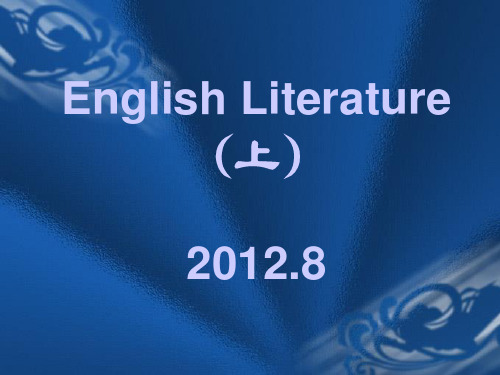
Literature is as literature does.
In exploring ideas about what literature is, it
is useful to look at some of the things that literature does.
Literature is something that reflects society,
ideology, just like it follows generic conventions as well as changing them.
It has social and political effects.
Literature is the creation of another world, a
What Is a Text?
Often, “text” is automatically equated with
“literature” or “literary work”, and the two terms can seem interchangeable.
literary works?
What makes us treat something as
literature?
How do we know when something is
literature?
Would it be easier to ask “what isn't
literature”?
world that we can only see through reading literature.
Reasons for the study of English Literature
English Literature (1)

Style/Genres: • oral tradition of literature • poetry dominant genre • unique verse form: (p. 8) · caesura · alliteration · repetition · 4 beat rhythm
The Canterbury Tales
• Plot: One day in April, 30 pilgrims at Tabard Inn, Southwark, Near London---the Shrine of St. Thomas a Becket at Canterbury: each was to tell two stories on the way to Canterbury and two more back. Judge: the innkeeper Reward: a free supper
English Literature (1)
李昌银
Old English/Anglo-Saxon Period: 499-1066 English/Anglo499Content: • strong belief in fate • juxtaposition of church and pagan worlds • admiration of heroic warriors who prevail in battle • express religious faith and give moral instruction through literature
• • • •
Length: 3182 Background: 6th century Date: probably written between 700-750 Spirit: a dark world, no love. Men seem seldom to relax. Clothed always in their armor, they are ready to go forth and test their courage against fate. • Their heroic ideal: excellence. The king or chieftain must excel in everything, esp. fighting. Skill and courage are the most important qualities. Beowulf is such a hero.
English-Literature-1英国文学1
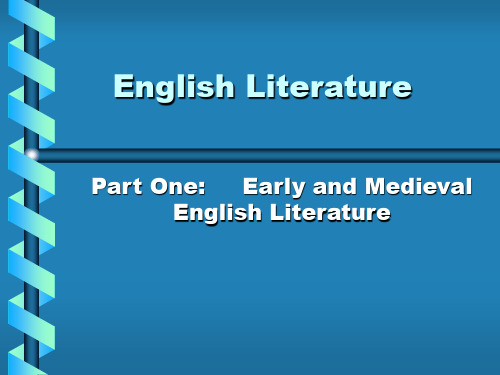
The literature of the Old English Period
• The epics are the earliest pieces of literature surviving from the Old English period. They are usually the composing in verse of tribal or national legends about a great hero, always a fighting warrior. Beowulf is a good example.
Back
Beowulf (1)
•
A manuscript of Beowulf
Beowulf (2)
• Beowulf, an Anglo-Saxon epic poem, the most important work of Old English literature. The poem consists of 3182 lines, each line with four accents marked by alliteration and divided into two parts.The somber story is told in vigorous, picturesque language, with heavy use of metaphor. The poem tells of a hero, a Scandinavian prince named Beowulf, who rids the Danes of the monster Grendel, half man and half fiend, and Grendel's mother, who comes that evening to avenge Grendel's death. Fifty years later Beowulf, now king of his native land, fights a dragon who has devastated his people. Both Beowulf and the dragon are mortally wounded in the fight. The poem ends with Beowulf's funeral as his mourners chant his epitaph..
English Literature wei
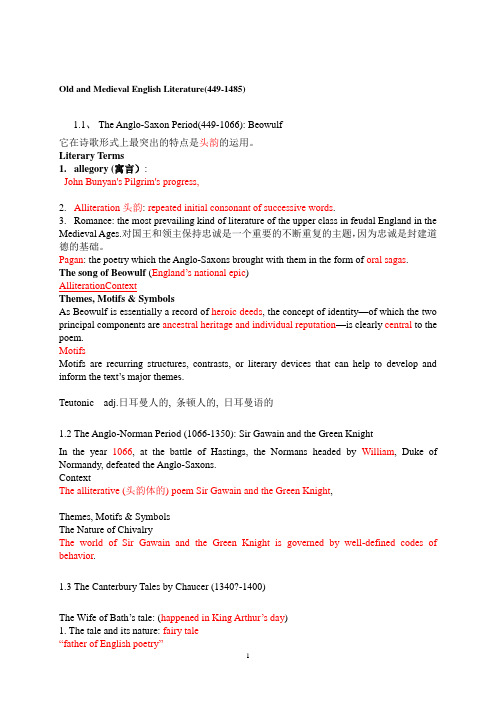
Old and Medieval English Literature(449-1485)1.1、The Anglo-Saxon Period(449-1066): Beowulf它在诗歌形式上最突出的特点是头韵的运用。
Literary Terms1.allegory (寓言):John Bunyan's Pilgrim's progress,2.Alliteration头韵: repeated initial consonant of successive words.3.Romance: the most prevailing kind of literature of the upper class in feudal England in the Medieval Ages.对国王和领主保持忠诚是一个重要的不断重复的主题,因为忠诚是封建道德的基础。
Pagan: the poetry which the Anglo-Saxons brought with them in the form of oral sagas.The song of Beowulf (England’s national epic)AlliterationContextThemes, Motifs & SymbolsAs Beowulf is essentially a record of heroic deeds, the concept of identity—of which the two principal components are ancestral heritage and individual reputation—is clearly central to the poem.MotifsMotifs are recurring structures, contrasts, or literary devices that can help to develop and inform the text’s major themes.Teutonic adj.日耳曼人的, 条顿人的, 日耳曼语的1.2The Anglo-Norman Period (1066-1350): Sir Gawain and the Green KnightIn the year 1066, at the battle of Hastings, the Normans headed by William, Duke of Normandy, defeated the Anglo-Saxons.ContextThe alliterative (头韵体的) poem Sir Gawain and the Green Knight,Themes, Motifs & SymbolsThe Nature of ChivalryThe world of Sir Gawain and the Green Knight is governed by well-defined codes of behavior.1.3The Canterbury Tales by Chaucer (1340?-1400)The Wife of Bath’s tale: (happened in King Arthur’s day)1. The tale and its nature: fairy tale―father of English poetry‖The plan of work is magnificent: to represent the wide sweep of English life by gathering a motley company together and letting each class of society tell its own favorite stories.In The Canterbury tales he has given us a picture of contemporary English life, its work and play, its deeds and dreams, fun and sympathy and hearty joy. It opens with a general prologue where we are told of a company of pilgrims that gathered at Tabard Inn in Southwork, a suburb of London. They are on their way to the shrine of St. Thomas a Becket at Canterbury. Harry Baily proposes that each pilgrim should tell two tales on the way to Canterbury and two more on the way back. The Prologue is a splendid masterpiece of realistic portrayal. Geoffrey ChaucerThe Wife of Bath’s Prologue and TaleThe Wife of Bath gives a lengthy account of her feelings about marriage. Quoting from the Bible, the Wife argues against those who believe it is wrong to marry more than once, and she explains how she dominated and controlled each of her five husbands.General Prologue: IntroductionAround this time of year, the narrator says, people begin to feel the desire to go on a pilgrimage.Many devout English pilgrims set off to visit shrines in distant holy lands, but even more choose to travel to Canterbury to visit the relics of Saint Thomas Becket in Canterbury Cathedral, where they thank the martyr for having helped them when they were in need.AnalysisThe Pervasiveness of Courtly LoveThe phrase ―courtly love‖ refers to a set of ideas about love that was enormously influential on the literature and culture of the Middle Ages.Fabliaux (讽刺性寓言诗)SymbolsSpringtimeThe springtime symbolizes rebirth and fresh beginnings, and is thus appropriate for the beginning of Chaucer’s text. Springtime also evokes erotic love, as evidenced by the moment when Palamon first sees Emelye gathering fresh flowers to make garlands in honor of May. The Squire, too, participates in this symbolism. He is compared to the freshness of the month of May, in his devotion to courtly love.ClothingIn the General Prologue, the description of garments, in addition to the narrator’s own shaky recollections, helps to define each character. In a sense, the clothes symbolize what lies beneath the surface of each personality.The Physician’s love of wealth reveals itself most clearly to us in the rich silk and fur of his gown. The Squire’s youthful vanity is symbolizedby the excessive floral brocade on his tunic.1.4The popular ballads1.Ballad: anonymous narrative songs that have been preserved by oral transmission.Lecture 31.The Renaissance (ca.1485-1603)2.1 Old England in Transition (Historical background)At the beginning of the 16th century absolute monarchy was formed in England. King Henry VIII (reigned 1509-1547) broke off with the Pope, dissolved all the monasteries and abbeys in the country, confiscated their lands and proclaimed himself head of the Church of England. Absolute monarchy in England reached its summit during the reign of Queen Elizabeth (reigned 1558-1603).and the Protestant Reformation was in essence a political movement in a religious guise, a part of the long struggle of the bourgeois class for power.Ⅲ. The English BibleThe first complete English Bible was translated by John Wycliffe (1324?-84),Then appeared the Authorized Version, which was made in 1611 under the auspices of James I and so was sometimes called the King James Bible.Ⅳ. The Enclosure Movement: Thomas More: ―sheep devoured men‖.The one is a thirsting curiosity for the classical literature.Another feature of the Renaissance is the keen interest in the activities of humanity. People ceased to look upon themselves as living only for God and a future world.The greatest of the English humanists was Thomas More, the author of "Utopia".I. English literature of the Early 16th centuryThomas More Utopia: gave a profound and truthful picture of the people’s sufferings and put forward his ideal of a future happy society. a critical examination of contemporary English institutions and customs.1.court poetry: Skelton; Wyatt and SurreyThomas Wyatt: he was the first to introduce the sonnet into English literature.II. English literature of the second half of the 16th century1.court poetry: Philip Sidney; Edmund Spenser2.Shakespeare: poems and SonnetsPlays: history plays, tragedies, comedies(The Merchant of Venice, Much ado about nothing无事生非, Twelfth Night), Tragi-comedies (Measure for Measure, Troilus and Cressida), Romance (The winter’s tale, the tempest)2.3 Important WritersEdmund SpenserEdmund Spenser (1552-1599): the greatest non-dramatic poet of the English Renaissance. Poet’s poetRhyme scheme: English writers: abab bcbc cdcd eePetrarch: abba bccb cde cdeDuring the Elizabethan age, love sonnets traditionally told the story of men in love with unattainable women."Sonnet 75" represents a successful Elizabethan sonnet with an optimistic view of love, but Spencer takes the success a step further by employing various literary techniques thataccentuate the story and imagery of his sonnet. His skillful use of form, rhyme, personification, and alliteration all contribute to the tight construction of this sonnet. By creating "Sonnet 75", Spenser immortalized love though verse, while showing his readers the skillful workings of his hand.1. Sonnets by ShakespeareThe Sonnet FormA sonnet is a fourteen-line lyric poem, traditionally written in iambic pentameter--that is, in lines ten syllables long, with accents falling on every second syllable, as in: "Shall I compare thee to a summer's day?"Two kinds of sonnets have been most common in English poetry, and they take their names from the greatest poets to utilize them: the Petrarchan sonnet and the Shakespearean sonnet. The Petrarchan sonnet is divided into two main parts, called the octave (前八行诗) and the sestet (六行诗).Sonnet 18 (shall I compare thee to a summer’s day?)In Britain, summer is mild, the most beautiful season. It is somehow similar to Spenser’s poems.1.(1-8) state a situation in the lady’s favor. You are like summer and you are even morebeautiful.2.You have not summer’s shortcomings, you are eternal. It is worthwhile to mention that inShakespeare’s day, this thought was common ―time—eternity‖. Carpe diemSummaryThe speaker opens the poem with a question addressed to the beloved: "Shall I compare thee to a summer's day?" The next eleven lines are devoted to such a comparison. In line 2, the speaker stipulates what mainly differentiates the young man from the summer's day: he is "more lovely and more temperate." Summer's days tend toward extremes: they are shaken by "rough winds"; in them, the sun ("the eye of heaven") often shines "too hot," or too dim. And summer is fleeting: its date is too short, and it leads to the withering of autumn, as "every fair from fair sometime declines." The final quatrain of the sonnet tells how the beloved differs from the summer in that respect: his beauty will last forever ("Thy eternal summer shall not fade...") and never die. In the couplet, the speaker explains how the beloved's beauty will accomplish this feat, and not perish because it is preserved in the poem, which will last forever; it will live "as long as men can breathe or eyes can see."CommentaryThis sonnet is certainly the most famous in the sequence of Shakespeare's sonnets; it may be the most famous lyric poem in English. Among Shakespeare's works, only lines such as "To be or not to be" and "Romeo, Romeo, wherefore art thou Romeo?" are better-known. This is not to say that it is at all the best or most interesting or most beautiful of the sonnets; but the simplicity and loveliness of its praise of the beloved has guaranteed its place.An important theme of the sonnet (as it is an important theme throughout much of the sequence) is the power of the speaker's poem to defy time and last forever, carrying the beauty of the beloved down to future generations. The beloved's "eternal summer" shall not fade precisely because it is embodied in the sonnet: "So long as men can breathe or eyes cansee," the speaker writes in the couplet, "So long lives this, and this gives life to thee."The Merchant of VeniceThemesFriendship requires sacrifice. Antonio risks his fortune–and later his life–to help Bassanio win Portia. Tubal lends Shylock the 3,000 ducats requested by Antonio.Appearances are deceiving. Neither the gold nor the silver casket contains the key to winning Portia. Instead, it is the plain lead casket. Shakespeare expresses this theme–appearances are deceiving–in a message inside the golden casket. It says, ―All that glisters [glitters] is not gold‖ (2. 7. 67). The latter quotation can also apply to characters who tie their happiness, destiny, or status to money, including Antonio, Bassanio, and Shylock.Jews suffer bigotry and other forms of mistreatment because of their religion and race.Christians alienate Shylock simply because he is a Jew. In ancient, medieval, and Renaissance times, Jews almost always encountered prejudice from non-Jews around them. Scholars are divided on whether Shakespeare, in The Merchant of Venice, was attempting condemn anti-Semitism by sympathizing with Shylock or approve of anti-Semitism by ridiculing Shylock. It may well be that Shakespeare was simply holding a mirror to civilization to allow audiences to draw their own conclusions. An essay on this page contends that Shakespeare wrote The Merchant of V enice partly to condemn the moral and ethical values of errant Christians, not the Jewish moneylender Shylock.Women can be just as competent as men, maybe even more so. Portia, disguised as a man, speaks eloquently in defense of Antonio and persuades the Duke of Venice to rule in Antonio's favor.Women can be just as ruthless as men, maybe even more so. Portia, who lectures Shylock and the court on the importance of mercy, exhibits racism after she rejects the Prince of Morocco because he is black. Moreover, she cleverly tricks and ruins Shylock without showing a hint of remorse.Don't count your ships until they're in port. Antonio confidently pledges the merchandise on his ships at sea to repay Shylock's loan to Bassanio. But all the ships are wrecked before they reach Venice.Great wealth and privilege breed apathy and disquietude. In the opening line of the play, Antonio says, "In sooth, I know not why I am so sad."3.The seventeenth-century English literature: the period of revolution and restoration(1603-1700)1.2John Donne and other metaphysical poets(One of his most famous sermons contains the passage beginning, "No man is an island" and ending, "Therefore ask not for whom the bell tolls; it tolls for thee.") Donne was the leading exponent of a style of poetry called "metaphysical poetry," which flourished in the late sixteenth and early seventeenth centuries. Metaphysical poetry features elaborate conceits and surprising symbols, wrapped up in original, challenging language structures, with learned themes that draw heavily on eccentric chains of reasoning.A Valediction: forbidding MourningSummaryThe speaker explains that he is forced to spend time apart from his lover, but before he leaves, he tells her that their farewell should not be the occasion for mourning and sorrow. In the same way that virtuous men die mildly and without complaint, he says, so they should leave without "tear-floods" and "sigh-tempests," for to publicly announce their feelings in such a way would profane their love.Commentary"A Valediction: forbidding Mourning" is one of Donne's most famous and simplest poems and also probably his most direct statement of his ideal of spiritual love.The speaker then declares that, since the lovers' two souls are one, his departure will simply expand the area of their unified soul, rather than cause a rift between them. If, however, their souls are "two" instead of "one", they are as the feet of a drafter's compass, connected, with the center foot fixing the orbit of the outer foot and helping it to describe a perfect circle. The compass (the instrument used for drawing circles) is one of Donne's most famous metaphors, The Importance of Obedience to GodThe first words of Paradise Lost state that the poem’s main theme will be ―Man’s first Disobedience.‖ Milton narrates the story of Adam and Eve’s disobedience, explains how and why it happens, and places the story within the larger context of Satan’s rebellion and Jesus’ resurrection. Raphael tells Adam about Satan’s disobedience in an effort to give hi m a firm grasp of the threat that Satan and humankind’s disobedience poses. In essence, Paradise Lost presents two moral paths that one can take after disobedience: the downward spiral of increasing sin and degradation, represented by Satan, and the road to redemption, represented by Adam and Eve.3.1、The pilgrim’s progress by Bunyan4.The Eighteenth-century English literature: the Age of Enlightenment and classicism(1700-1798)4.1、Poems by Pope4.2、Poems by Burns4.3、Poems by Blake4.4、A Modest proposal by Swift4.5、To the right honorable the Earl of Chesterfield by Johnson4.6、Robinson Crusoe by Defoe5.The Romantic English literature (1798-1832)5.1、William Wordsworth"Tintern Abbey"George Gordon, Lord ByronⅢ. "Don Juan":Percy Bysshe Shelley5.2、John Keats5.3、Jane Austen: Pride and PrejudiceContextShe distinguishes between internal merit (goodness of person) and external merit (rank and possessions). The opening sentence of Pride and Prejudice—―It is a truth universally acknowledged, that a single man in possession of a good fortune, must be in want of a wife‖—establishes the centrality of advantageous marriage, a fundamental social value of Regency England.The second daughter in the Bennet family, and the most intelligent and quick-witted, Elizabeth is the protagonist of Pride and Prejudice and one of the most well-known female characters in English literature. Her admirable qualities are numerous—she is lovely, clever, and, in a novel defined by dialogue, she converses as brilliantly as anyone. Her honesty, virtue, and lively wit enable her to rise above the nonsense and bad behavior that pervade her class-bound and often spiteful society. Nevertheless, her sharp tongue and tendency to make hasty judgments often lead her astray; Pride and Prejudice is essentially the story of how she (and her true love, Darcy) overcome all obstacles—including their own personal failings—to find romantic happiness. As she gradually comes to recognize the nobility of Darcy's character, she realizes theerror of her initial prejudice against him.Fitzwilliam DarcyThe son of a wealthy, well-established family and the master of the great estate of Pemberley, Darcy is Elizabeth's male counterpart. The narrator relates Elizabeth's point of view of events more often than Darcy's, so Elizabeth often seems a more sympathetic figure. The reader eventually realizes, however, that Darcy is her ideal match. Intelligent and forthright, he too has a tendency to judge too hastily and harshly, and his high birth and wealth make him overly proud and overly conscious of his social status. Indeed, his haughtiness makes him initially bungle his courtship. When he proposes to her, for instance, he dwells more on how unsuitable a match she is than on her charms, beauty, or anything else complimentary. Darcy proves himself worthy of Elizabeth, and she ends up repenting her earlier, overly harsh judgment of him.Jane Bennet and Charles Bingleyboth are cheerful, friendly, and good-natured, always ready to think the best of others; they also demonstrate that such a love is mildly dull.Mrs. BennetMrs. Bennet is a miraculously tiresome character. Noisy and foolish, she is a woman consumed by the desire to see her daughters married and seems to care for nothing else in the world.The Victorian English literature: critical realism (1832-1901)The Rise of Critical Realism in EnglandⅠ.2. Thomas Cooper (1805-1892):"the last of the Chartists",English Critical Realism:6.1、Robert BrowningDramatic monologue:整首诗出自一个独立于作者之外的剧中人的独白,创造出一个有限的情境,仿佛是一部完整的戏剧作品中的某个片段。
大学英语英国文学1English Literature
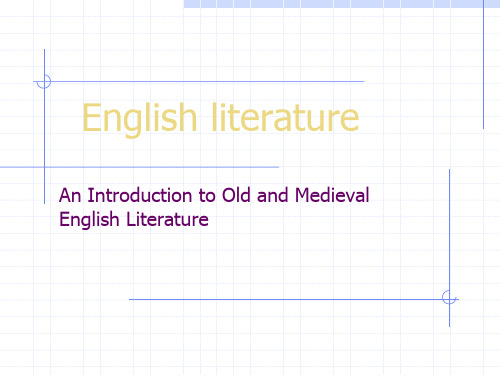
From 1066 to mid-14th century
Middle English literature deals with a wider range of subjects,greater diversity of styles,tones and genres
Romance uses narrative verse or prose to sing knightly adventures or other heroic deeds
2018/11/3
18
Artistic Features
(1) Messenger of Humanism
Affirm man's right to pursue earthly happiness Praise man's energy, intellect, quick wit and love of life Expose and satirize the social vices, including religious abuses
English literature
An Introduction to Old and Medieval English Literature
History Background
Early inhabitants---Celts---were conquered 3 times: a. Romans b. Anglo-Saxons: Germanic language and culture c. Normans: Mediterranean civilization (Greek culture, Roman law, Christian religion)
English Literature
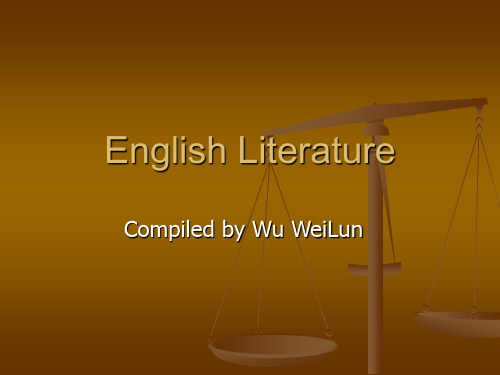
Literature shows us not only what a society is like in a certain age, but also what individual feel about it, what they hope from it, and how they can change it or escape from it.
Other approaches(2)
post- structuralism Decostructuralism Our textbook is arranged in
chronological order, but we deal with each period analytically with emphasis axon period
(449-1066)
1. historical background
Three conquests: Roman conquest in 43 AD; Anglo-Saxon conquest in 449; Norman conquest in 1066
2. literature
1): pagan: oral sagas: the Song of Beowulf 2): Christian: copied by the monk. The influence of the Christianity upon
language and culture. Two ecclesiastic poets: Caedmon and
English literature

1fromA B IBLIOGRAPHY OF L ITERARY T HEORY,C RITICISM AND P HILOLOGYhttp://www.unizar.es/departamentos/filologia_inglesa/garciala/bibliography.htmlby José Ángel G ARCÍA L ANDA(University of Zaragoza, Spain)H ISTORY OF E NGLISH L ITERATURETop tenGeneralMiscellaneousModern English literature (1500-)Top tenBaugh, Albert C., ed. A Literary History of England.1967. 4 vols.London: Routledge, 1977. 1985.*Daiches, David. A Critical History of English Literature. London: Secker, 1988-89.*Dobrée, Bonamy, and Norman Davis, gen. eds. The Oxford History of English Literature. Oxford: Clarendon, 1945-.*Ford, Boris, ed. The New Pelican Guide to English Literature. 10 vols.Harmondsworth: Penguin, 19872-84.*Jeffares, A. Norman, gen. ed. Macmillan History of Literature.12 vols. Houndmills: Macmillan, 1982-.Kermode, Frank, and John Hollander, eds. The Oxford Anthology of English Literature. 6 vols. Oxford: Oxford UP, 1973.* Sampson, George. The Concise Cambridge History of English Literature.3rd. ed. Rev. by R. C. Churchill. Cambridge:Cambridge UP, 1970. 1979.*Sanders, Andrew. The Short Oxford History of English Literature.Oxford: Oxford UP, 1994.*Sphere History of English Literature. London: Sphere, 1971. Rev. ed.1986. Rpt. as Penguin History of Literature. Harmondsworth:Penguin, 1993.Ward, A. W. (Sir), and A. R. Waller, eds. The Cambridge History of English Literature. 15 vols. Cambridge: Cambridge UP, 1907-16. 1978.History of English Literature-GeneralAdams, Robert M., The Land and Literature of England: A Historical Account. New York: Norton, 1983.Alexander, Michael. A History of English Literature.Houndmills: Palgrave Macmillan, 2000.- - -. A History of English Literature. 2nd ed. (Palgrave Foundations Series). Houndmills: Palgrave Macmillan, 2007.* (Part 1:Medieval; Part 2: Tudor and Stuart; Part 3: Augustan andRomantic; Part 4: Victorian Literature to 1880 [sic, actually to1900]; Part 5: The Twentieth Century; Postscript on theCurrent).Arnold, Thomas. A Manual of English Literature: Historical and Critical. 4th. ed. London: Longmans, 1877.*Barnard, Robert. A Short History of English Literature.Oxford: Blackwell, 1994.Bate, Jonathan, gen. ed. The Oxford English Literary History. Oxford: Oxford UP, c. 2003-.Bateson, F. W. A Guide to English Literature.Chicago: Aldine, 1965.*- - -. A Guide to English Literature. 2nd ed. London: Longmans, 1967. Bateson, Frederick Wilse, and Harrison T. Meserole. A Guide to English and American Literature. London: Longman, 1976.* Blamires, Harry. A Short History of English Literature.London: Methuen, 1974. 2nd ed. 1984.- - -. A Short History of English Literature.2nd ed. London: Routledge, 1989. 1994.*Baugh, Albert C., ed. A Literary History of England.1967. 4 vols.London: Routledge, 1977. 1985.*Borges, Jorge Luis, and Esther Vázquez. Introducción a la literatura inglesa. Buenos Aires: Columba, 1965.*Burgess, Anthony. English Literature. London: Longman, 1958.- - -. English Literature. New ed. London: Longman, 1974. Carreres de Calatayud, Francisco de. Historia de la literatura inglesa, basada en la L ITERARY H ISTORY OF E NGLAND de A. Baugh.Introd. A. Baugh. Madrid: Prensa Española, 1974.*Carter, Ronald, and John McRae. The Penguin Guide to English Literature: Britain and Ireland.Introd. Alan Maley.Harmondsworth: Penguin, 1995.*- - -. The Routledge History of Literature in English: Britain and Ireland. Foreword by Malcolm Bradbury. London: Routledge, 1997. 1998.*Cazamian, Louis, and E. Legouis. Histoire de la littérature anglaise.1924.- - -. A History of English Literature. 1927, rev. ed. 1945.Conrad, Peter. The Everyman History of English Literature. London: Dent, 1987.*Coote, Stephen. The Penguin Short History of English Literature.Harmondsworth: Penguin.*Cox, Michael. The Concise Oxford Chronology of English Literature.Oxford: Oxford UP, 2004.Craig, Hardin, general ed. A History of English Literature.5 vols.Oxford: Oxford UP. Rpt. Collier.Daiches, David. A Critical History of English Literature.2 vols.London: Secker and Warburg, 1960.*- - -. A Critical History of English Literature. 4 vols. London: Secker, 1968.- - -. A Critical History of English Literature. 2nd ed. London: Secker, 1971.- - -. A Critical History of English Literature. London: Secker, 1988-89.*- - -. A Critical History of English Literature. 2 vols. London: Mandarin.*Dobrée, Bonamy, and Norman Davis, gen. eds. The Oxford History of English Literature. Oxford: Clarendon, 1945-.*Entwistle, W. J., and Eric Gillet. The Literature of England AD 500-1950: A Survey of English Literature from the Beginnings tothe Present Day. 3rd ed. London: Longman, 1952.*Evans, Ifor. A Short History of English Literature.1940. London: Longman, 1948.*- - -. A Short History of English Literature. Harmondsworth: Penguin, 1958. 4th ed. 1979.*- - -. A Short History of Enlgish Literature. 2nd. ed. London: MacGibbon and Kee, 1964.- - -. Breve historia de la literatura inglesa. Barcelona: Ariel, 1985.* Ford, Boris, ed. The Pelican Guide to English Literature. 9 vols.Harmondsworth: Penguin, 1954-61. 1973-75.*- - -, ed. The Pelican Guide to English Literature. Vol 6: From Dickens to Hardy. Harmondsworth: Penguin Books, 1958.1973.*- - -, ed. The New Pelican Guide to English Literature.10 vols.Harmondsworth: Penguin, 19872-84.*Hudson, William Henry. An Outline History of English Literature.London: Bell, 1932.*Jeffares, A. Norman, gen. ed. Macmillan History of Literature.12 vols. Houndmills: Macmillan, 1982-.Legouis, E. A Short History of English Literature."Literatura en lengua inglesa." In Wikipedia: La enciclopedia libre.* /wiki/Literatura_inglesa2009Lott, Bernard. A Course in English Language and Literature. London: Arnold, 1986.Martín Gutiérrez, F., C. Pérez Gállego, A. Usandizaga, et al. Historia de la literatura inglesa. 2 vols. Madrid, 1988.McRae, John. The Penguin Guide to English Literature: Britain and Ireland. Introd. Alan Maley. Harmondsworth: Penguin, 1995.* McRae, John, and Luisa Pantaleoni. Words on the Page: A Course in English Literature. Oxford: Oxford UP, / La Nuova Italia, 1986. Monnickendam, Andrew, ed. Introduction to English Literature.Barcelona: EDIUOC, 1999.Nünning, Vera, and Ansgar Nünning. Grundkurs anglistisch-amerikanistische Literaturwissenschaft.Stuttgart: Klett, 2001.4th ed. 2004.*- - -. An Introduction to the Study of English and American Literature.Trans. Jane Dewhurst. (Uni-Wissen: Anglistik-Amerikanistik).Stuttgart: Klett, 2004.*Ousby, Ian, ed. The Cambridge Guide to Literature in English.London: Cambridge UP / Hamlyn, 1988.*Peck, John, and Martin Coyle. A Brief History of English Literature.Houndmills: Palgrave, 2002.*Penguin History of Literature. Harmondsworth: Penguin, 1993.Pérez Gállego, Cándido, ed. Historia de la literatura inglesa. 2 vols.Madrid: Taurus, 1988.*Portillo, Rafael. Guía básica para estudiantes de Literatura Inglesa.Sevilla: Publicaciones de la Universidad de Sevilla, 1981.* Pujals Fontrodona, Esteban. Historia de la Literatura Inglesa. Madrid: Gredos, 1984.*Quennell, P. A History of English Literature. 1973. London: Ferndale Editions, 1981.Robson, W. W. A Prologue to English Literature. Totowa (NJ): Barnes and Noble, 1986.*Rogers, Pat, ed. The Oxford Illustrated History of English Literature.Oxford: Oxford UP, 1987.*Rowse, Alfred Leslie. The English Spirit: Essays in History and Literature. London: Macmillan, 1950.Sage, Lorna, ed. The Cambridge Guide to Women's Writing in English. Cambridge: Cambridge UP, 1999.*Saintsbury, George. A Short History of English Literature. 1898. New York: Macmillan, 1907.*Sampson, George. The Concise Cambridge History of English Literature. Cambridge: Cambridge UP, 1941.- - -. The Concise Cambridge History of English Literature. 3rd. ed.Rev. by R. C. Churchill. Cambridge: Cambridge UP, 1970.1979.*- - -. Historia de la literatura inglesa: Universidad de Cambridge.Madrid: Pegaso, 1953.*Sanders, Andrew. The Short Oxford History of English Literature.Oxford: Oxford UP, 1994.*Schroer, Arnold. Historia de la literatura inglesa. Barcelona: Labor, 1935.Sphere History of English Literature. London: Sphere, 1971. Rev. ed.1986. Rpt. as Penguin History of Literature.Stapleton. The Cambridge Guide to English Literature.Cambridge: Cambridge UP, 1983.*Taine, Hippolite. Histoire de la littérature anglaise. Paris: Hachette, 1863-64.- - -. History of English Literature. 4 vols. Edinburgh: 1873-1908.- - -. History of English Literature. Trans. H. Van Laun. 1871. 2 vols.New York: Holt, 1874.- - -. History of English Literature. Trans. H. Van Laun. New York: Ungar, 1965.Tejedor, J. M., and Ricardo Navarrete. An Introduction to English Literature with Selected Writings. Sevilla: Kronos, 1995. Thompson, Denys. What to Read in English Literature.London: Heinemann, 1975.Thoorens, Léon. Panorama des littératures: Angleterre et Amérique du Nord.. Verviers (Belgium): Gérard, 1977.- - -. Historia Universal de la Literatura: Inglaterra y América del Norte. Trans. L. Rodriguez. México: Daimon, 1977. Thorne, Sara. Mastering Advanced English Literature. Houndmills: Macmillan, 2000.Tomasi di Lampedusa, Giuseppe. Letteratura inglese, Volume primo.Milan: Mondadori, 1990.- - -. Letteratura inglese, Volume secondo. Milan: Mondadori, 1991. Villalba, Estefanía. Claves para interpretar la literatura inglesa. (El Libro Universitario. Materiales/ Filología y Lingüística).Madrid: Alianza Editorial, 1999.*Ward, A. W. (Sir), and A. R. Waller, eds. The Cambridge History of English Literature. 15 vols. Cambridge: Cambridge UP, 1907-16. 1978.- - -, eds. The Cambridge History of English and American Literature.An Encyclopedia in Eighteen Volumes. Vol. VII:English: Cavalier and Puritan.Electronic edition ():/217/29/4/04Wyatt, A. J. The Tutorial History of English Literature.2nd ed.London: Clive, 1901.Wynne-Davies, Marion. Bloomsbury Guide to English Literature.London: Bloomsbury, 1989.*English literature: MiscellaneousAckroyd, Peter. "The Englishness of English Literature." Proceedings of the XIXth International Conference of AEDEAN. Ed. Javier Pérez Guerra et al. Vigo: Departamento de Filoloxía Inglesa e Alemana da Universidade de Vigo, 1996. 11-20.*Arias, Martín, and Martín Hadis, eds. Borges, profesor: Curso de literatura inglesa de la Universidad de Buenos Aires.2000.Barcelona: Emecé, 2002.*Bell, Ian, ed. Contests in the Canon of English Literature. (Studies in Twentieth Century Literature). Harlow: Addison Wesley Longman, 1999.Bolton, W. F. A Short History of Literary English.Totowa (NJ): Littlefield, 1973.Burgess, Anthony. They Wrote in English. Non-fiction.Caramés, JoséLuis, et al., eds. Estudios literarios ingleses.4 vols.Madrid: Cátedra.Chateaubriand. Essai sur la littérature anglaise. 1836. Claybourgh, Arthur. The Grotesque in English Literature.Oxford: Clarendon, 1965.Craik, George L. Sketches of the History of Literature and Learning in England. 1844-5.Eaglestone, Robert. Doing English: A Guide for Literature Students.London: Routledge, 1999.Espejo Romero, Ramón, Rafael Portillo García, Antonio Rodríguez Celada and María del Mar Gallego Durán. "Relaciones literarias entre España y el mundo anglosajón: Pasado y presente." In Fifty Years of English Studies in Spain […] Actas del XXVI Congreso de AEDEAN,ed. Ignacio Palacios et al.Santiago de Compostela: U de Santiago de Compostela, 2003.837-45.*Freedman, Jonathan. The Temple of Culture: Assimilation and Anti-Semitism in Literary Anglo-America.New York: Oxford UP,2000. pbk 2002.Gilbert, A. J. Literary Language from Chaucer to Johnson. London: Macmillan. 1979.Gill, Richard. Mastering English Literature.2nd ed. (Macmillan Master Series). Houndmills: Macmillan, 1995.Gray, Martin. A Chronology of English Literature. Harlow: Longman, 1989.*Grierson, H. J. C. The Background of English Literature and Other Collected Essays and Addresses. London: Chatto, 1925.* Hazlitt, William. Lectures on the English Comic Writers.1819.Oxford: Oxford UP.Hoenselaars, T., and M. Buning, eds. English Literature and the Other Languages. Amstedam: Rodopi, 1999.Hyland, Paul, and Neil Sammells, eds. Writing and Censorship in Britain. London: Routledge, 1992.Kenneally, Michael, Edwin Thumboo and Wolfgang Zach, eds.Literatures in English: Priorities of Research.Tübingen:Stauffenburg. Forthcoming 2006.Last, R. W., ed. Affinities. Essays in German & English Literature [for] Oswald Wolff. Wolff, 1971.MacLure, Millar, and F. W. Watt, eds. Essays in English Literature from the Renaissance to the Victorian Age Presented to A. S. P.Woodhouse. Toronto: U of Toronto P, 1964.*Manlove, Colin. The Fantasy Literature of England.Houndmills: Macmillan, 1999.Marsh, Nicholas. How to Begin Studying English Literature. 2nd ed.(How to Study series). Houndmills: Macmillan, 1995.Mendizábal, Federico. Historia de la literatura inglesa.Valladolid: Encicl. Práctica, n. d.Nabokov, Vladimir. Lectures on Literature.Ed. Fredson Bowers.Introd. John Updike. New York: Harcourt, 1980.- - -. Littératures, 1. Paris: Le Livre de Poche. (English and French literature).Naupert, Cristina. "La literatura comparada en los países de habla inglesa.." In : E-Excellence/cgi-bin/aco/lit_comp/temas.asp2005-05-05Petersen, Per Serritslef, ed. Literary Pedagogics after Deconstruction: Scenarios and Perspectives in the Teaching of EnglishLiterature.: Aarhus UP, 1992.Rosenbaum, S. P., ed. English Literature and British Philosophy.Chicago: U of Chicago P, 1971.Rubinstein, A. The Great Tradition in English Literature from Shakespeare to Shaw.Vol. 1. New York: Monthly Review Press, 1969.Rylance, Rick, and Judy Simons, eds. Literature in Context.Houndmills: Macmillan, 2000.Schlaeger, Jürgen, ed. Structures of Cultural Transformation. (REAL: Yearbook of Research in English and American Literature 20).Tübingen: Gunter Narr, 2004.Stein, Gertrude. "What Is English Literature?" Lectures in America.Boston: Beacon, 1957.Stephen, Martin. An Introductory Guide to English Literature.Harlow: Longman-York, 1984.Thomson, J. A. K. The Classical Background of English Literature .London : Allen & Unwin, 1948.Wright. Biographia Britannica literaria. (19th c.).Zhenzhao, P. N. (An Ethical Study of English Literature).2007. (In Chinese).AnthologiesAbrams, M. H., et al., eds. The Norton Anthology of English Literature. 2 vols. New York: Norton, 1986.Abrams, M. H., gen. ed. The Norton Anthology of English Literature.7th ed. Vol. 1. Associate gen. ed. Stephen Greenblatt. New York: Norton, 1999.*Alexander, Michael, and A. Norman Jeffares, series eds. (Macmillan Anthologies of English Literature series). Houndmills: Macmillan, c. 1989.Arber, Edward, ed. An English Garner: Ingatherings from our History and Literature. Ed. Edward Arber. London, 1877. Bain, Carl E., Jerome Beaty, and J. Paul Hunter. The Norton Introduction to Literature. 5th ed. New York: Norton, 1991. Bastida Rodríguez, Patricia, and Paloma Fresno Calleja. English Literature: An Anthology. (Colección Materiales Didácticos, 114). Palma de Mallorca: Servicio de Publicaciones de la Universitat de las Illes Balears, 2005.Clark, Robert, and Thomas Healy, eds. The Arnold Anthology of British and Irish Literature in English.London: Hodder Headline-Arnold, 1997.*Collins, John Churton, ed. An English Garner: Critical Essays and Fragments. n. d.Greenblatt, Stephen, gen. ed. The Norton Anthology of English Literature.8th ed. The Major Authors.Founding Editor Emeritus M. H. Abrams. Editors: Carol T. Christ, Alfred David, Barbara K. Lewalski, Lawrence Lipking, George M. Logan, Deridre Shauna Lynch, Katharine Eisaman Maus, James Noggle, Jahan Ramazani, Catherine Robson, James Simpson, Jon Stallworthy, Jack Stillinger. New York: Norton, 2006.* Jeffares, A. Norman, and Michael Alexander, series eds. Macmillan Anthologies of English Literature series. Basingstoke: Macmillan, 1989.Kermode, Frank, and John Hollander, eds. The Oxford Anthology of English Literature. 6 vols. Oxford: Oxford UP, 1973.*- - -, eds. The Oxford Anthology of English Literature. Vols. 1-3 in One Volume. New York: Oxford UP, 1973.- - -, eds. The Oxford Anthology of English Literature.Vols. 4-6 in One Volume. New York: Oxford UP, 1973.Spender, Dale, and Janet Todd, eds. An Anthology of British Women Writers. London: Pandora, 1989.*Tejedor, JoséMaría. An Introduction to English Literature with Selected Readings. Sevilla: Kronos, 1995. Rev. in Revista Alicantina de Estudios Ingleses 8 (November 1995).BlogsThe Little Professor. Academic blog (Miriam Burstein, SUNY)./2008BibliographiesAbrams, M. H., Stephen Greenblatt et al., eds. "Selected Bibliographies."In The Norton Anthology of English Literature.7th ed. Ed. M. H. Abrams, Stephen Greenblatt et al. New York:Norton, 1999. 1.2899-2932.*Bateson, F. W. ed. The Cambridge Bibliography of English Literature.1940. Cambridge: Cambridge UP, 1969.*Beal, Peter, comp. Index of English Literary Manuscripts. Vol. 1, 2 parts. London: Mansell, 1980; Vol. 2 part 1, 1987.Bond, Donald F. A Reference Guide to English Studies.Chicago, 1962.Bateson, F. W., ed. The Cambridge Bibliography of English Literature. Cambridge: Cambridge UP, 1969.*Lee, S., and F. S. Boas, eds. The Year's Work in English Studies.Oxford, 1919-Modern Humanities Research Association Annual Bibliography of the English Language and Literature. Cambridge, 1921- Walpole, Horace. Catalogue of Royal and Noble Authors of England.2 vols. Twickenham: Strawberry Hill Press, 1758.Watson, George. The New Cambridge Bibliography of English Literature. Cambridge: Cambridge UP, 1969.CDsLandow, George P. Context32: A Web of English Literature.Electronic database. With David Cody, Kathryn Stockton, et al.Providence, R. I.: Institute for Research in Information and Scholarship, 1987.DictionariesBlain, Virginia, ed. The Feminist Companion to Literature in English: Women Writers from the Middle Ages to the Present. London: Batsford, 1990.*Blain, Virginia, Patricia Clements and Isobel Grundy, eds. The Feminist Companion to Literature in English.London: Yale UP, 1990.Browning, D. C. Dictionary of Literary Biography: English and American. London: Dent, 1965.*A Critical Dictionary of English Literature. 1870.Daiches, David, ed. The Penguin Companion to Literature: British and Commonwealth Literature.Harmondsworth: Penguin,1971.*Drabble, Margaret. The Oxford Companion to English Literature. 5th ed. Oxford: Oxford UP, 1985.*- - -, ed. The Oxford Companion to English Literature. 6th ed. Oxford: Oxford UP, 2000.*Drabble, Margaret, and Jenny Stringer, eds. The Concise Oxford Companion to English Literature.1987. Oxford: Oxford UP,1990.*- - -, eds. The Concise Oxford Companion to English Literature. Rev.ed. Oxford: Oxford UP, 1996.*Drabble, Margaret, Jenny Stringer and Daniel Hahn. The Concise Oxford Companion to English Literature.(Oxford PaperbackReference). Oxford: Oxford UP, 2003.Harvey, Paul (Sir), ed. The Oxford Companion to English Literature.4th ed. Oxford: Oxford UP, 1969.*Kunitz, Stanley, and Howard Haycraft. British Authors before 1800:A Biographical Dictionary. 1952.Oxford Dictionary of National Biography/2005-09-25Internet resourcesAcademic Info: English studies./englang.html2008British Council Literature Department/arts-literature.htmBritish Council Literature Department, E-Mail Discussion Group./arts/literature/discussion/subscribe.htm British Literature Resources./schoolweb/cchsweb/english/britlit.html#modernEngelsk Instituut, Norges Teknisk-Naturvitenskapelige Universiteit (Norway)http://www.hf.ntnu.no/engelsk/English and American Literature: A Guide to Internet Resources./Subj/engl/internet.htmD iscontinued 2008English Literature on the Web, University of Nagoyahttp://lang.nagoya-u.ac.jp/~matsuoka/EngLit.html#General2008English Literature Wiki/wiki/2005-06-21Discontinued 2008Cliffs Notes/2008Fent Filologia Anglesa per Internet, University of Barcelona http://www.bib.ub.es/www8/0recang.htmDiscontinued 2008ICA database on contemporary British writing./ica/Bookshop/video/englit.htmlDiscontinued 2008Internet Resources in English.http://carleton.ca/english/links.htmD iscontinued 2008Lion: Literature Online. Internet database. Chadwyck-Healey, 1996-. Library of Congress, Main Reading Room(Literatures in English: Literary Criticism, Alcove 9: An Annotated List of Reference Websites)./rr/main/alcove9/literature/criticism.html2009Oxford University Computing Service "Text Archive".archive@uk.ac.oxford.vaxOxford UP Literature/uk/literature@Rice University (Fondren Library) English literature resources /ref/english.cfm2008Risorse elettroniche per le letterature in lingua inglese (Universitàdegli studi di Parma)http://www.unipr.it/arpa/dipling/help-desk/SubjectGatewayUK.html2007SparkNotes/poetry/blake/context.html2005-05-20UVPress. In Módulos Multi Media. Ed. Vicente Fores (U de Valencia).http://www.uv.es/~fores/2004-11-22Wiki de literatura anglo-española. Ed. José Luis Gamboa Jiménez./HomePage.html2008Voice of the Shuttle/2008Yahoo comprehensive English server. Internet:/JournalsThe Cambridge QuarterlyEd. David C. Gervais, et al.,Info: /camqui/Oxford Journals Subscription DepartmentOxford University PressWalton StreetOxford OX2 6DPVol. 24.4 (1995).*English Literary History 47 (1980). (Johns Hopkins UP). Publications of the Modern Language Association (PMLA)Ed. Patricia YaegerU of Michigan, Ann Arbor/pmla2007A Review of English Literature 3 (July 1962).PrizesBooker PrizeDavid Cohen British Literature PrizeJames Tait Black PrizeSeries: Critical(Author Chronologies series). Gen. ed. Norman Page. Basingstoke: Macmillan.(British Anthologies 5). Frowde, 1899.(Brodie's Notes). Houndmills: Macmillan.(Casebooks Series). Series ed. A. E. Dyson. Houndmills: Macmillan. (Clásicos Anglística). Salamanca: Ediciones Colegio de España, c.1997.(Cliffs Notes).(The Complete Critical Guide to English Literature). Series eds.Richard Bradford and Jan Jedrzejewski (both U of Ulster, Coleraine, Northern Ireland). London: Routledge, 2000-.(Critical Assessments of Writers in English, 21st set). Robertsbridge (East Sussex): Helm information, 2003.*(Critical Issues). Houndmills: Macmillan, c. 2000.(European Studies in English Literature). Cambridge: Cambridge UP,c. 1989.(Introductions to English Literature, 2). Series ed. Bonamy Dobrée.London: Cresset Press, 1938.*(Longman Literature in English Series). Ed. David Carroll and Michael Wheeler. Harlow: Pearson-Longman, c. 2000. (Macmillan Master Guides). Houndmills: Macmillan.(Oxford Companions). Oxford: Oxford UP, c. 2003.(Oxford English Monographs). Oxford: Oxford UP, c. 2000.*(Oxford History of English Literature, vol. 6). New York: Oxford UP, 1969.*(Palgrave Advances). Houndmills: Palgrave Macmillan, c. 2006.(The Penguin History of Literature, 5). Harmondsworth: Penguin, 1994.*(Preface Books series). Ed. Maurice Hussey. London: Longman, 1974-.(Stratford-upon-Avon Studies). London: Arnold, c. 1970.(Studies in British Literature). Lampeter: Mellen, c. 1998.(Transitions). Series ed. Julian Wolfreys. Houndmills: Macmillan, c.2000.(Writers and Their Background). London, c. 1972.(Writers and Their Work series). (n.s.) Plymouth: Northcote House/ British Council, 1994-.Series: Literary(Longman Literature). London: Longman.(Oxford Library of Prose and Poetry). c. 1912.(Oxford Standard Authors). Oxford: Oxford UP.(Penguin English Library). Harmondsworth: Penguin, 1981.Modern English literatureAragay, M., and A. Moya. Literatura inglesa II: Texto-Guía.Barcelona: U de Barcelona, 1997.Cox, Michael. The Oxford Chronology of English Literature. Oxford: Oxford UP, 2002. (Print).Stephens, John, and Ruth Waterhouse. Literature, Language and Change from Chaucer to the Present. London: Routledge, 1990. Widdowson, Peter The Palgrave Guide to English Literature and Its Contexts, 1500-2000. Houndmills: Palgrave, 2004. AnthologiesFerguson, Moira, ed. First Feminists: British Women Writers 1578-1799. Bloomington: Indiana UP, 1985.Internet resourcesEmory Modern and Contemporary British Literature /ENGLISH/ModBrit.html JournalsSEL: Studies in English Literature, 1500-1900Rice UniversityP. O. Box 1892Houston, Texas 77251USAVol. 42.2 (Spring 2002).。
介绍英国文学的英语作文

An Introduction to English LiteratureEnglish literature, spanning centuries of rich history and diverse cultural influences, is a vast and vibrant field that has produced numerous iconic works and influential authors. From the earliest epic poems to modern-day novels and plays, English literature has always been a reflection of the times, capturing the essence of human experience and emotion.The early ages of English literature saw the emergence of epic poems such as Beowulf, a story that exemplifies the virtues of bravery, loyalty, and sacrifice. The medieval period was marked by the development of chivalric romances and religious poetry, reflecting the values and beliefs of the time.The Renaissance brought about a significant shift in English literature, introducing the concept of humanism and emphasizing the importance of the individual. Shakespeare, often regarded as the greatest English writer, emerged during this period, producing a vast array of plays and poems that are still widely studied and performed today. His works, such as Hamlet, Romeo and Juliet, and Macbeth, explore themes of love, revenge, and the complexities of human nature.The 18th century was a period of enlightenment and rationality, reflected in the works of authors such as Jane Austen and Charles Dickens. Austen's novels, such as Pride and Prejudice and Emma, focus on the lives of the upper classes, exploring themes of social class, love, and marriage. Dickens, on the other hand, was a social critic whose works, such as Oliver Twist and A Tale of Two Cities, expose the injustices and inequalities of society.The 20th century saw a further diversification of English literature, with the emergence of modernism, postmodernism, and other literary movements. Authors such as Virginia Woolf, James Joyce, and T.S. Eliot experimented with new forms of expression, exploring themes of consciousness, memory, and the role of the individual in society.Today, English literature continues to evolve and expand, with new voices and perspectives emerging from all corners of the globe. From contemporary novelists such as Zadie Smith and Chimamanda Ngozi Adichie to poets like Seamus Heaney and Carol Ann Duffy, English literature remains a vibrant and relevant field that continues to captivate the imaginations of readers around the world.。
英国文学上册Unit One The Abglo-Saxon Period
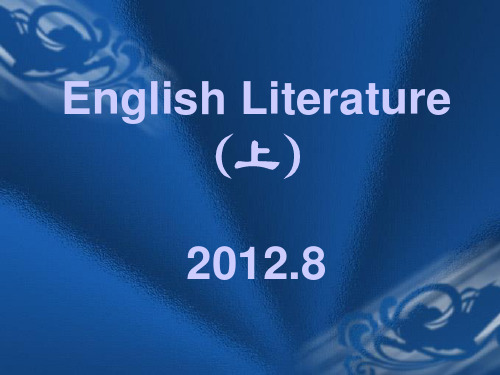
the true, the good & the beautiful
The common definition of literature, particularly for university courses, is that it covers the major genres of poetry, drama, and novel/fiction.
What makes us treat something as literature?
How do we know when something is literature?
Would it be easier to ask “what isn't literature”?
Literature is as literature does.
In exploring ideas about what literature is, it is useful to look at some of the things that literature does.
Literature is something that reflects society, makes us think about ourselves and our society, allows us to enjoy language and beauty, it can be didactic, and it reflects on “the human condition”.
What Is a Text?
English_literature_I简介和古英语时期英国文学PPT教案
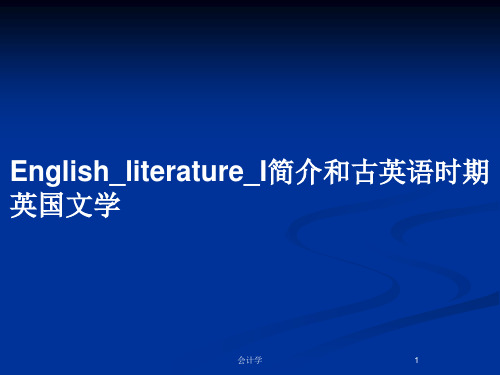
from the following formula, we can know that the English people are of a mixed blood:
Angles
Britons + Saxons + Danes + Normans = English
Jutes
3 famous conquests in the British history:
(3) Training one’s thinking.
(4) Fostering one’s connoisseurship (the ability to appreciate a work of art)
(5) Exerting a favorable influence on a person’s feeling or character
Radiocarbon dating in 2008 suggested that the first stones were erected in 2400–2200 BC, whilst another theory suggests that bluestones may have been erected at the site as earlture
Literature is a permanent expression in words of some thoughts or feelings or ideas about life & the world.
Literary genres
Narrative, lyric, dramatic Poetry, prose, drama, fiction
English_literature_I简介和古英语时期 英国文学
关于英文文学的英文作文
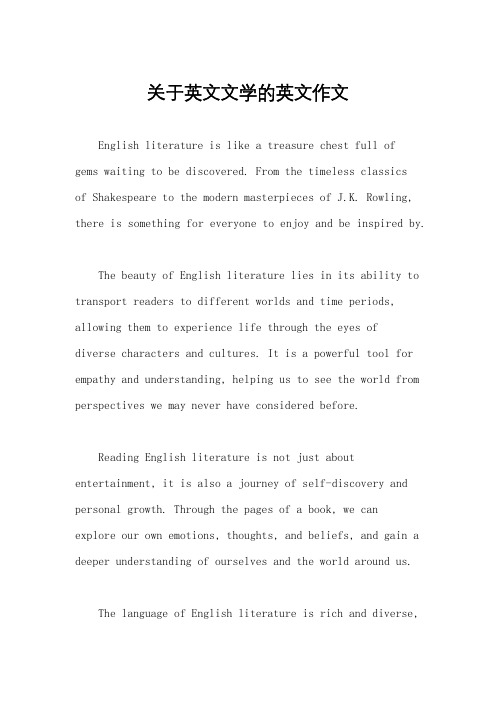
关于英文文学的英文作文English literature is like a treasure chest full of gems waiting to be discovered. From the timeless classicsof Shakespeare to the modern masterpieces of J.K. Rowling, there is something for everyone to enjoy and be inspired by.The beauty of English literature lies in its ability to transport readers to different worlds and time periods, allowing them to experience life through the eyes ofdiverse characters and cultures. It is a powerful tool for empathy and understanding, helping us to see the world from perspectives we may never have considered before.Reading English literature is not just about entertainment, it is also a journey of self-discovery and personal growth. Through the pages of a book, we canexplore our own emotions, thoughts, and beliefs, and gain a deeper understanding of ourselves and the world around us.The language of English literature is rich and diverse,filled with vivid imagery, poetic language, and powerful storytelling. It has the ability to evoke strong emotions, provoke deep thoughts, and inspire change. It is a reflection of the human experience, capturing the essence of what it means to be alive.In a world filled with noise and distractions, English literature offers a sanctuary for the soul, a place where we can escape, reflect, and connect with something greater than ourselves. It is a source of comfort, inspiration, and wisdom, reminding us of the power of words to heal, transform, and uplift.。
介绍文学英语作文初一
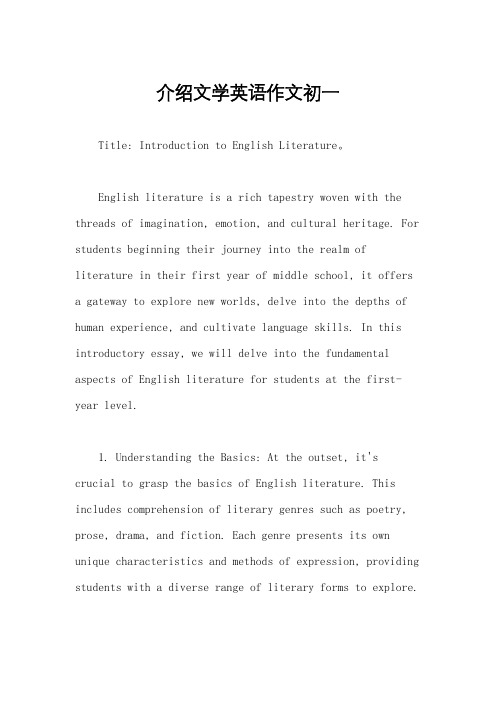
介绍文学英语作文初一Title: Introduction to English Literature。
English literature is a rich tapestry woven with the threads of imagination, emotion, and cultural heritage. For students beginning their journey into the realm ofliterature in their first year of middle school, it offers a gateway to explore new worlds, delve into the depths of human experience, and cultivate language skills. In this introductory essay, we will delve into the fundamental aspects of English literature for students at the first-year level.1. Understanding the Basics: At the outset, it'scrucial to grasp the basics of English literature. This includes comprehension of literary genres such as poetry, prose, drama, and fiction. Each genre presents its own unique characteristics and methods of expression, providing students with a diverse range of literary forms to explore.2. Exploring Literary Elements: English literature encompasses a variety of literary elements that contributeto the richness of texts. These elements include plot, character, setting, theme, and symbolism. Understanding how these elements interact within a narrative framework enhances students' ability to analyze and appreciateliterary works.3. Developing Analytical Skills: Analytical skills are paramount in the study of English literature. Studentslearn to critically evaluate texts, discern underlying themes and messages, and interpret the intentions of authors. Through close reading and thoughtful analysis,they gain insight into the complexities of human nature and society as depicted in literature.4. Appreciating Cultural Context: Literature serves asa reflection of the cultural milieu in which it is produced. Through the study of English literature, students gain insight into different historical periods, societal norms, and cultural movements. They learn to contextualizeliterary works within their historical and culturalsettings, fostering a deeper appreciation for the diversity of human experiences.5. Fostering Language Skills: English literature provides a fertile ground for the development of language skills. Reading a wide array of texts exposes students to diverse vocabulary, sentence structures, and stylistic techniques. Additionally, engaging in literary analysis and expression through writing helps students refine their communication skills and express their ideas with clarity and precision.6. Cultivating Empathy and Insight: Literature has the power to foster empathy and broaden one's perspective. Through encountering characters from different backgrounds and experiences, students develop empathy and understanding for the complexities of the human condition. They also gain insight into universal themes such as love, loss, courage, and resilience, which resonate across cultures and time periods.In conclusion, the study of English literature in thefirst year of middle school lays the foundation for alifelong journey of literary exploration and appreciation. By understanding the basics, exploring literary elements, developing analytical skills, appreciating cultural context, fostering language skills, and cultivating empathy and insight, students embark on a transformative journey that enriches their intellectual and emotional lives. As they delve deeper into the vast expanse of English literature, they will continue to discover new treasures of wisdom, beauty, and meaning.。
讲义week one
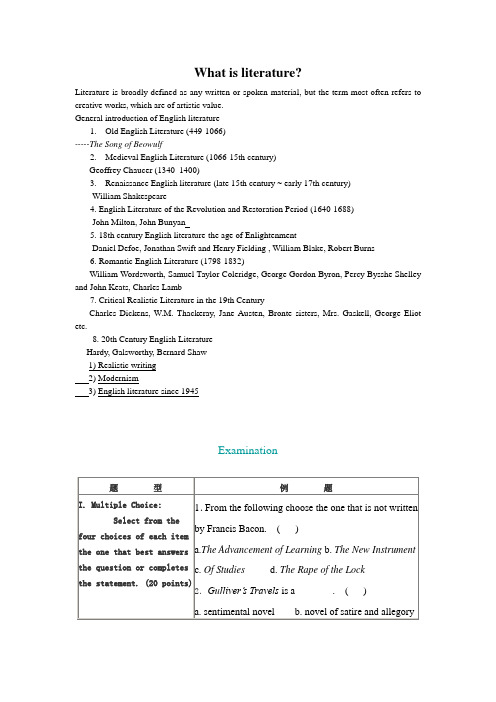
What is literature?Literature is broadly defined as any written or spoken material, but the term most often refers to creative works, which are of artistic value.General introduction of English literature1. Old English Literature (449-1066)-----The Song of Beowulf2. Medieval English Literature (1066-15th century)-----Geoffrey Chaucer (1340_1400)3. Renaissance English literature (late 15th century ~ early 17th century)------William Shakespeare4. English Literature of the Revolution and Restoration Period (1640-1688)------John Milton, John Bunyan5. 18th century English literature-the age of Enlightenment------Daniel Defoe, Jonathan Swift and Henry Fielding , William Blake, Robert Burns6. Romantic English Literature (1798-1832)-----William Wordsworth, Samuel Taylor Coleridge, George Gordon Byron, Percy Bysshe Shelley and John Keats, Charles Lamb7. Critical Realistic Literature in the 19th Century-----Charles Dickens, W.M. Thackeray, Jane Austen, Bronte sisters, Mrs. Gaskell, George Eliot etc.8. 20th Century English Literature----Hardy, Galsworthy, Bernard Shaw---- 1) Realistic writing---- 2) Modernism---- 3) English literature since 1945ExaminationThe Anglo-Saxon Peri od (449—1066)Targets:• 1.了解古英语时期文学的历史背景,文学特征,主要作家和作品• 2.掌握古英语诗歌的特点• 3.史诗《贝武奥甫》及写作特点ROMAN CONQUEST:In 55 B.C., Britain was invaded by Julius Caesar, the Roman Conqueror. But as soon as the Romans landed on shore of the island, the Britons fought like lions. And with the comings and goings of many Roman generals within the time of the century, Britain was not completely subjugated to the Roman Empire until 78 A.D. With the Roman Conquest the Roman mode of life came across to Britain also. The Roman occupation lasted for about 400 year. It was also during the Roman rule that Christianity was introduced to Britain.After the fall of the Roman Empire (410 A.D.), the aboriginal Celtic population was conquered bythe Teutonic Tribes of Angles, Saxons and Jutes who named the central part of Albion Anglia, or England. Their dialects gradually grew into a single language called Anglo-Saxon, or Old English. Before the Anglo-Saxons settled in Britain they lived in tribal society. Each group of families united by kinship fixed its home in a separate village and after that the Anglo-Saxon period witnessed a transition from tribal society to feudal society.Literature characteristicsThe literature of this period is divided into pagan literature and Christian literature.The former represent poetry and in form of oral sagas. The later represents the writings developed under teaching of the monks. The poetry was copied by the monks and has the religious coloring and most of works can not find its scribe.Four main writers:•Caedmon, the father of English song, is the first known religious poet of England. He wrote a poetic Paraphrase of the bible•Cynewulf produced the didactic poem The Christ•Venerable Bede, a monk who wrote in Latin and whose work The Ecclesiatical History of the English People earned for him the title of “Father of English History”.•Alfred the Great (848-901) wrote The Anglo-Saxon Chronicles. This book records the main happenings of the Anglo-Saxon period. It is the best monument of the Old English prose.The Song of Beowulf•Representative achievement of Anglo-Saxon periodThe Song of Beowulf is England‟s national epic. It was written by an unknown scribe at the beginning of the 10th century and was discovered in 1705. It reflects events which took place approximately at the beginning of the 6th century.Its chief significance lies in the vivid portrayal of a great national hero, who is brave, courageous, selfless, and ever helpful to his people and his kinsfolk.•The epic consists of 3182 lines and is to be divided into two parts.Writing Features of the Poem:•1) It is not a Christian but a pagan poem. The whole poem presents us an all-round picture of the tribal society and Christian culture,incorporating myth, legend, folk tale and history, which of national significance.•2) The use of the strong stress and the predominance of consonants are very notable in this poem. Each line is divided into two halves, and each half has two heavy stresses.•3) The use of the alliteration is another notable feature. Three stresses of the whole line are made even more emphatic by the use of alliteration.•4) A lot of metaphor and understatement are used in the poem. For example, the sea is called "the whale-road" or "the swan road"; the soldiers are called "shield-men"; the chieftains are called the "treasure keepers"; human-body is referred to as "the bone- house”; God is called "wonder-wielder”; Monster is referred to as "soul-destroyer". Literary terms:•Epic: It is, originally, an oral narrative poem, majestic both in theme and style. Epics deal with legendary or historical events of national or universal significance, involving action of broad sweep and grandeur. Eg: Iliad 《伊利亚特》,Odyssey《奥德赛》Paradise Lost 《失乐园》,The Divine Comedy《神曲》。
- 1、下载文档前请自行甄别文档内容的完整性,平台不提供额外的编辑、内容补充、找答案等附加服务。
- 2、"仅部分预览"的文档,不可在线预览部分如存在完整性等问题,可反馈申请退款(可完整预览的文档不适用该条件!)。
- 3、如文档侵犯您的权益,请联系客服反馈,我们会尽快为您处理(人工客服工作时间:9:00-18:30)。
Northwestern coast of Europe Mysterious nature Brave but superstitious
Significance & Features
1. Epic form: a long verse narrative on the exploits of a national hero, Beowulf 2. representation of the tribal society of ancient times: The primitive people’s heroic struggle against hostile forces of the natural world under a wise leader;
“Thus made their mourning the men of Geatland, For their hero’s passing, his hearth-companions Quoth that of all the kings of earth, Of men he was the mildest and most beloved, To his kin the kindest, keenest to praise.”
Some of the Features of Epic
The hero is a figure of imposing stature, of national or international importance, and of great historical or legendary significance; The setting is vast in scope, covering great nations, the world, or the universe; The action consists of deeds of great valor or requiring superhuman courage; Supernatural forces ---gods, angels, and demons-- interest themselves in the action and intervene from time to time; A style of sustained elevation and grand simplicity is used;
Norman Conquest (1066-15th cen.)P5-8
Master and servant Language By the end of 15th cen., intermingled structure and common words remained Norman terms were adopted into the English language
Alliteration
Alliteration is regular repetition of the same sounds---usu. initial consonants of words or of stressed syllables--- in Old and Middle English verse. Example:
The English Ballands
Ballad:
Border ballads Robin Hood ballads
Ballad
Ballad is a folk song or orally transmitted poem telling in a direct and dramatic manner some popular story derived from history or legend. The story is told simply and often with vivid dialogue. Ballads are normally composed in quatrains with different rhyme schemes.
English Literature
Requirements
Get some reference books as your supplementary readings Preview each chapter or unit carefully Prepare a notebook & take notes in class Be attentive & responsive in class Review after class & Read the untaught texts in the textbooks by yourself Mind your attendance in class
religious belief: The Pagans/heathens
Old English Literature (secular)
Began with the A-S settlement in England Tales passed on orally by minstrels 吟唱诗 人 Five relics preserved: four are short fragments of long poems; one long poem of over 3,000 lines.
The Roman Conquest (55 B.C.-410 A.D.)
Influences on Britain
Politics of self-government Transportation system (highways) Cities (London) Latin Language Christianity
Middle English Literature
Romance 罗曼史 (P8-16)
Roman matters of subjects : Trojan War, Alexander the Great French matters of subjects: Emperor Charlemagne and his peers English romance: King Arthur and his round-table knights; “Sir Gawain and the Greenknight” (1360-1370), “Le Morte d’Arthur” by Sir Thomas Malory
Social condition: Began feudalism;
new social strata: serfs 农奴—freemen 自由民— farmers 农民— thanes 乡士— earls 爵爷— kings 王爷 Old mythology of northern Europe Christianized in 7th Cen.
Example A simple narrative song, or a narrative poem suitable for singing. The ballad usually has a short stanza, such as: There are twelve months in all the year, As I hear many men say, But the merriest month in all the year Is the merry month of May.
Beowulf
The most important existent work; the national epic of Anglo-Saxons
Written down in 10th cen. Partly-historical and partly-legendary Not about England but their homeland in Denmark
Romance
Romance which uses narrative verse or prose to sing of knightly adventures or other heroic deeds is a popular literary form in the Middle Ages. The importance of romance itself can be seen as a means of showing medieval aristocratic men and women in relation to their idealized view of the world.
Reference Book
Chen Jia eds. Selected Reading in English Literature (In Three Volumes), The Commercial Press, 1984. 张伯香主编《英国文学教程》(修订版上、 下),武汉大学出版社,2006年5月。 常耀信著《英国文学简史》(英文版)南开大 学出版社,2006年1月第一版。
English/Anglo-Saxon Conquest (446-1066)
Germanic tribes (Angles, Saxons, Jutes) from the Mediterranean coasts: Scandinavia, Denmark and Germany Enslaved the Celts and drove others to Wales, Scotland and Ireland By 7th cen. Combined: England A whole people: English A single language: Anglo-Saxon (Old English)
